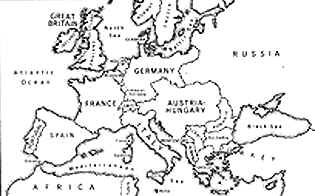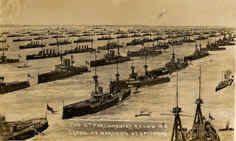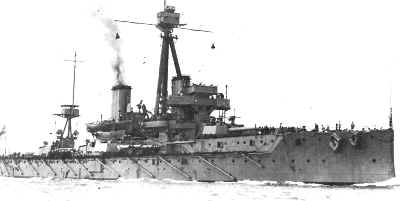The causes of World War One are complicated and unlike the causes of World War Two, where the guilty party was plain to all, there is no such clarity. Germany has been blamed because she invaded Belgium in August 1914 when Britain had promised to protect Belgium. However, the street celebrations that accompanied the British and French declaration of war gives historians the impression that the move was popular and politicians tend to go with the popular mood.
Was much done to avoid the start of the war?
By 1914, Europe had divided into two camps.
The Triple Alliance was Germany, Italy and Austria-Hungary.
The Triple Entente was Britain, France and Russia.
|
|
The alliance between Germany and Austria was natural. Both spoke the same language – German – and had a similar culture. In previous centuries, they had both been part of the same empire – the Holy Roman Empire.
Austria was in political trouble in the south-east of Europe – the Balkans. She needed the might of Germany to back her up if trouble got worse. Italy had joined these countries as she feared their power on her northern border. Germany was mainland Europe’s most powerful country – so from Italy’s point of view, being an ally of Germany was an obvious move. Each member of the Triple Alliance (Germany, Austria and Italy) promised to help the others if they were attacked by another country.
The Triple Entente was less structured than the Triple Alliance. “Entente” means understanding and the members of the Entente (Britain, France and Russia) did not have to promise to help the other two if they got attacked by other countries but the understanding was that each member would support the others – but it was not fixed.
France was suspicious of Germany. She had a huge army but a poor navy. Britain had the world’s most powerful navy and a small army. France and Britain joining together in an understanding was natural.
Britain was also concerned about Germany because she was building up a new and powerful navy. The inclusion of Russia seemed odd when Russia was so far from France and Britain. However, Russia’s royal family, the Romanovs, was related to the British Royal Family. Russia also had a huge army and with France on the west of Europe and Russia on the east, the ‘message’ sent to Germany was that she was confronted by two huge armies on either side of her borders. Therefore, it was not a good move by Germany to provoke trouble in Europe – that was the hoped for message sent out by the Triple Entente.
Certain specific problems also helped to create suspicion throughout Europe. The first was Germany’s fear of the huge British Empire.
By 1900, Britain owned a quarter of the world. Countries such as Canada, India, South Africa, Egypt, Australia and New Zealand were either owned by Britain or were still highly influenced by the British Empire. Queen Victoria had been crowned Empress of India. Huge amounts of money were made from these colonies and Britain had a powerful military presence in all parts of the world. The Empire was seen as the status symbol of a country that was the most powerful in the world. Hence Britain’s title “Great Britain”.
Germany clearly believed that a sign of a great power was possession of overseas colonies. The ‘best’ had already been taken by Britain but Germany resolved to gain as much colonial territory as possible.
Her main target was Africa. She colonised territory in southern Africa (now Namibia) which no-one really wanted as it was useless desert but it did create much anger in London as Germany’s new territories were near South Africa with its huge diamond and gold reserves. In reality, Germany’s African colonies were of little economic importance but it gave her the opportunity to demonstrate to the German people that she had Great Power status even if this did make relations with Britain more fragile than was perhaps necessary for the economic returns Germany got from her colonies.
A second issue that caused much friction between Britain and Germany was Germany’s desire to increase the size of her navy. Britain accepted that Germany, as a large land-based country, needed a large army. But Germany had a very small coastline and Britain could not accept that Germany needed a large navy.
|
|
Postcard from 1912 of the Spithead review of Britain’s Navy
Britain concluded that Germany’s desire to increase the size of her navy was to threaten Britain’s naval might in the North Sea. The British government concluded that as an island we needed a large navy and they could not accept any challenges from Germany. As a result, a naval race took place. Both countries spent vast sums of money building new warships and the cost soared when Britain launched a new type of battleship – the Dreadnought. Germany immediately responded by building her equivalent. Such a move did little to improve relations between Britain and Germany. All it did was to increase tension between the two nations.
|
HMS Dreadnought 17,900 tons; 526 feet in length; ten 12 inch guns, eighteen 4 inch guns, five torpedo tubes; maximum belt armour 11 inches; top speed 21.6 knots. |
With Europe so divided, it only needed one incident to spark off a potential disaster. This incident occurred at Sarajevo in July 1914.


